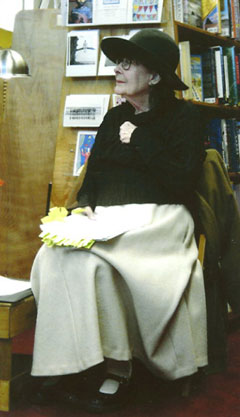Marcelia Yeh dies at 91
Updated: 2008-02-05 18:54
Berkeley, California -- Marcelia Yeh, a professor of English at Peking University for 25 years from 1951 to 1976, passed away on February 2, 2008, in Berkeley, California, at the age of 91.
 |
|
Marcelia Yeh, a professor of English at Peking University for 25 years from 1951 to 1976, passed away on February 2, 2008, at the age of 91. |
Born in London, Ohio, Marcelia was a proud descendent of Irish immigrants. Her grandfather was a country doctor and her father a lawyer. As a young woman, Marcelia developed a love for poetry and performed in theater. After graduating from college she moved to New York City to pursue these two passions. She lived in Greenwich Village, where she met her future husband, Dr. Yap Chu Phay, a visiting scientist from China, through her friends Toshi and Pete Seeger.
Upon the founding of the People's Republic of China in October 1949, Marcelia, deeply moved by her husband’s great passion for his country, moved to China with her one-year-old son, Kippy, to help build a new society with Yap Chu Phay and the Chinese people. Not long after their arrival in Beijing, their elder daughter, Suzanna, was born. Their second daughter, Cathy, followed two years later.
While her husband helped create the heavy industry for the New China, Marcelia joined the faculty of the English Department of Peking University (at the time known as the Western Languages Department of Yen Ching University). Until she retired in 1976, she helped New China cultivate generations of talented English-speakers; many of whom came to play prominent roles in China's foreign affairs and international communication. Though a foreigner in China, Marcelia gained respect for her fervent teaching of English language and literature. Among her students were former Foreign Minister Li Zhaoxing, and many Chinese and Korean high public officials.
Marcelia came to China at a time when the Sino-US relationship was at the freezing point. She came across much suspicion and unfriendliness in the early years. Even with this human challenge, along with not speaking the language, Marcelia steadfastly held onto her innate optimism and naive enthusiasm, bravely embracing this new country and its people.
Marcelia's life in China was framed by series of political movements, culminating in the Cultural Revolution (1966-76). With each wave, she earnestly struggled to engage with its underlying purpose, always emerging with renewed compassion for those who were suffering. During the Cultural Revolution, she continued teaching her students in their dormitory rooms and peasants in the fields. Her husband was persecuted as the founding director of the Metallurgy (now Process) Institute under the Chinese Academy of Sciences, and died in 1971 as a member of the Standing Committee of the Third National People's Congress. Even then, Marcelia continued to encourage her children not to blame the Chinese people for their father’s death.
Marcelia's tenacious spirit and passionate love of life can be traced back to her Irish roots, combined with growing up in a small town in the middle of America. The combination gave her the foundation and strength to persevere against seemingly insurmountable odds, always emerging with endless optimism and compassion, her spirit intact.
From early in life, Marcleia wrote poetry, winning many prizes and publishing numerous poems. The poems she wrote during her life in China are now housed at the New York University archive. During the Cultural Revolution, Marcelia began keeping a diary, which she continued for 7 or 8 years. The ten volumes are unique personal record of a transformational political revolution.
After her retirement in 1976, Marcelia returned to the United States. At 60, her strong curiosity and passion for learning propelled her into the University of California at Berkeley's Master's Program in Creative Writing, with a focus on women's literature. While at UC Berkeley, Marcelia found a new footing for her life in the United States, steeped in the deep friendships she formed with the young women with whom she studied and the invigoration of new knowledge. These women in turn were hugely influenced by her utterly unique perspective towards life. Her master's thesis combined her own poetry and criticism. After graduating, she eagerly returned to Peking University for a semester to share her new knowledge and enthusiasm with her colleagues and students.
At this time, Marcelia started writing short stories based on her life in China. Until her death, she was an active member in the literary scene in Berkeley, publishing the poetry collection Hillegass Street, and participating in many public poetry readings.
Back in the United States, she once again engaged actively in civic life, in Berkeley and in her neighborhood. Although not a wealthy woman, she never forgot her civic responsibility and contributed to worthy organizations and causes in which she believed.
Marcelia possessed a young person's quest and curiosity for knowledge and truth. Even in the most difficult circumstances, she never gave up her ideals and principles. She was a model for her children, grandchildren, friends, neighbors and colleagues to the end of her life.
Marcelia spent the last years of her life in the home of her eldest daughter, Suzanna, and her husband, Bill. Her stepson, Liangxi, and his wife, Xiao Hua, her son, Kippy and his wife, Sabina, and Marcelia's youngest daughter, Cathy and her husband Rudolf, came often to visit. Marcelia passed away peacefully surrounded by her loving children, grandchildren and friends.
|
|
|
||
|
||
|
|
|
|
